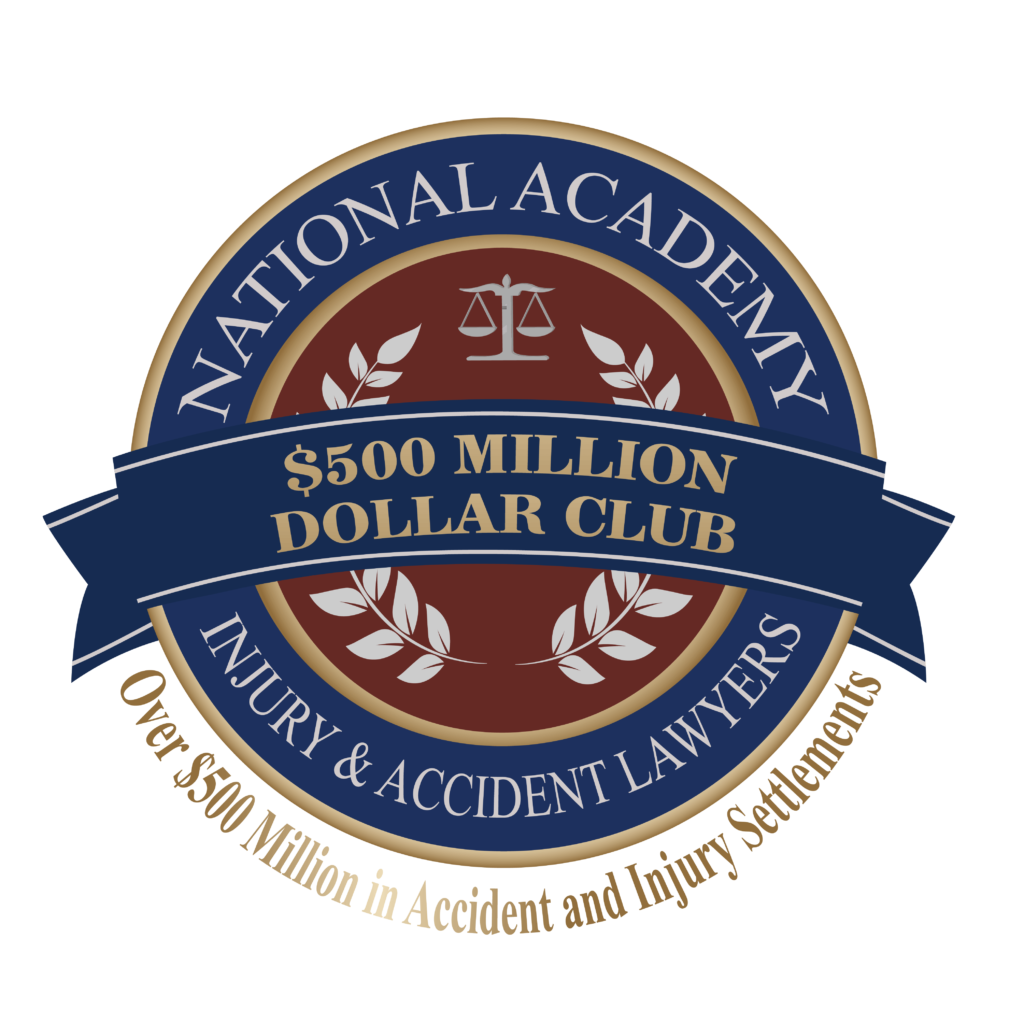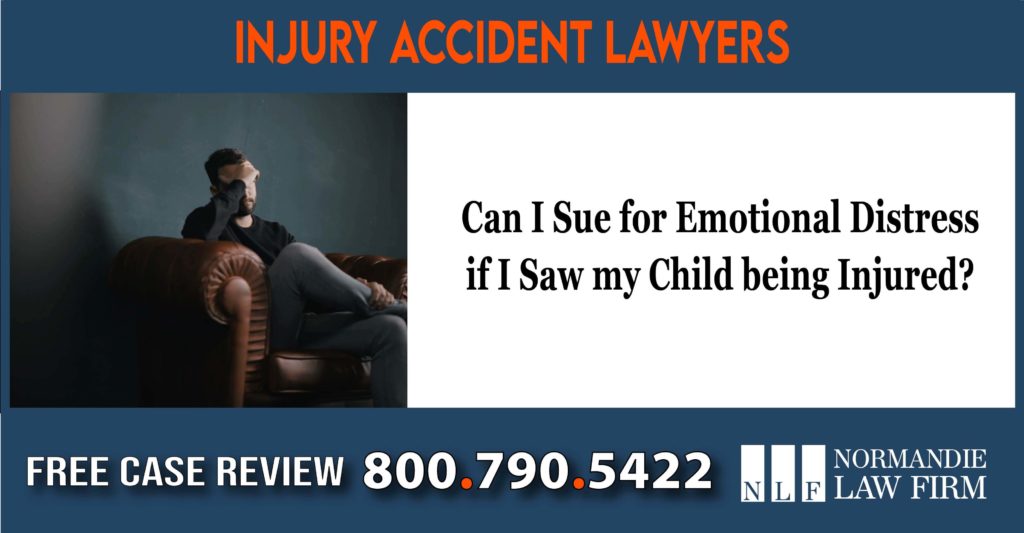Most people understand the concept of suing another party for monetary compensation if they are injured in an accident or criminal event. Monetary damages can include emotional distress, which is a category of mental suffering and psychological damage that’s associated with a traumatic incident. Many people associate emotional distress with assault and battery or sexual assault, but it can happen from a variety of accidents, including car crashes, collapsing buildings, and natural disasters.
According to the direct victim theory, a plaintiff can sue for damages if they suffered emotional distress as a direct result of the defendant’s negligence. But there is a lesser known concept referred to as NIED, or negligent infliction of emotional distress. However, it’s clear that the basic principle for damages from NIED are on people’s minds, as we have had quite a number of people ask us over the years:
“Can a parent of family sue for emotional distress if they witnessed their child being injured in an accident or assaulted?”
Yes, it’s possible to sue a negligent individual or entity for third party emotional distress if you witnessed a loved one being injured or killed. Compensation from this type of lawsuit may include payments for medical bills, mental health counseling, lost wages, and pain and suffering. However, it’s essential to understand the eligibility requirements for a bystander claim and what you will need to prove in order to proceed with a legal case.
To discuss the concept of NIED with a California personal injury attorney, call us to schedule a free case review.

Our Recent Verdicts and Settlements
$22 Million
$2.25 Million
$1.5 Million
$1.1 Million
$734,851
$2.3 Million
Definition of Emotional Distress under California Law
Before we examine the concept of negligent infliction of emotional distress, let’s take a look at how emotional distress is defined under California law. Emotional distress encompasses a variety of conditions that are associated with suffering and mental anguish, such as:
- Anxiety
- Fright
- Horror
- Shock
- Humiliation
- Shame
- Emotional trauma
- Grief
Plaintiffs in California are not required to have physical symptoms resulting from emotional distress to seek compensation. However, they must show that the level of emotional distress is severe, meaning the average person would struggle to cope with the distress that’s been brought on by witnessing their loved one being harmed. Physical conditions, like sleep disorders or unexplained weight loss are certainly helpful in proving these cases, but again, this is not a requirement to proceed with a claim for NIED.
What is Negligent Infliction of Emotional Distress?
Now, let’s explore the meaning of negligent infliction of emotional distress, which refers to emotional harm you suffer as a bystander of injury to a close relative. Essentially, you were not physically harmed from the defendant’s intentional or negligent conduct. Instead, you were a third party witness that was traumatized by seeing your loved one being assaulted or injured.
Here is an example of an incident that can serve as grounds for an NIED lawsuit:
A woman is walking around the neighborhood with her child. A person who is distracted by his phone fails to see the mother and child walking across the street in time and hits the child, who is severely injured. Because the mother was a witness to such a horrifying incident, she would be allowed to sue the negligent driver for monetary damages due to negligent infliction of emotional distress.
This is just one example, so it’s important to contact a personal injury lawyer right away and verify your eligibility for an NIED cause of action. Contact our law firm and schedule a free consultation if you witnessed a loved one being attacked or injured in an accident.
Which Family Members Qualify for 3rd Party NIED Claims?
One of the most critical elements of a claim for NIED is your relation to the victim, meaning you and the injured party must be close relatives. According to California law, “close relatives” is defined as the following:
- Your children, siblings, parents, or grandparents (immediate family members)
- Your spouse, a registered domestic partner, or relative that lives in your home
Keep in mind that domestic partners refer to couples that have filed a Declaration of Domestic Partnership in California. It does not include couples that are living together without being registered, even if they have cohabitated for many years.
How to Prove a Case of NIED
Aside from having a close family relationship, there are several elements you will need to show in order to prove that you are suffering from negligent infliction of emotional distress:
- The conduct by the defendant, which was negligent or intentional, caused injuries or death to your loved one.
- You were at the scene of the accident or injury at the time of the incident and witnessed the victim being injured.
- As a result of what you saw, you suffered what would be deemed as serious emotional distress according to the California court system.
These are the elements of the bystander theory, which is a complex legal concept that must be applied on a case-by-case basis. Frankly, there is no universal standard for how this theory is interpreted in a traumatic accident where one person witnesses significant harm to a spouse or relative.
Most people are under the impression that only intentional conduct can serve as the basis for an NIED claim. We would agree that cases are generally easier to prove when the defendant acts with deliberate malice, like using excessive force on the victim during an argument (use of weapons, chokeholds, etc.). However, most defendants don’t set out to harm someone when they engage in reckless or careless conduct. What matters is that they failed to exercise reasonable care for others, which the average person would have exercised in a similar situation.
Due to complexities that are involved, it’s best to seek guidance from a lawyer with experience in compensation claims for negligent infliction of emotional distress.
Contact Our Law Firm
Personal injury is an extremely complicated concept, as there are so many ways that a person can be harmed by someone else’s negligence. In addition, bystanders of the incident that are close relatives of the victim can end up with severe emotional trauma based on what they witnessed. The laws in California allow for the recovery of damages for NIED, but it takes extensive legal knowledge and court experience to succeed in one of these claims.
Normandie Law Firm has decades of experience in the representation of accident victims and their family members. We have a thorough understanding of the nuances that are involved with these cases, and how to recover a just compensation award on behalf of the victim’s loved ones.
We are happy to offer you a free case review if you have yet to file a claim. But we are also here for you if you need a second opinion on an existing NIED claim. Either way, we will represent you for free under the Zero Fee Guarantee. Legal fees are included in the settlement award that you receive from the defendant, so we make absolutely nothing unless we win your case.
For a free case evaluation or free second opinion on your rights and legal options, contact us 24 hours a day, 7 days a week.
Other Pages on Our Website Related to This Topic
CrossFit Accident Injury Lawyers
Falling Awning Injury Attorney
Slip And Fall Injury At A Funeral Home Lawsuit













